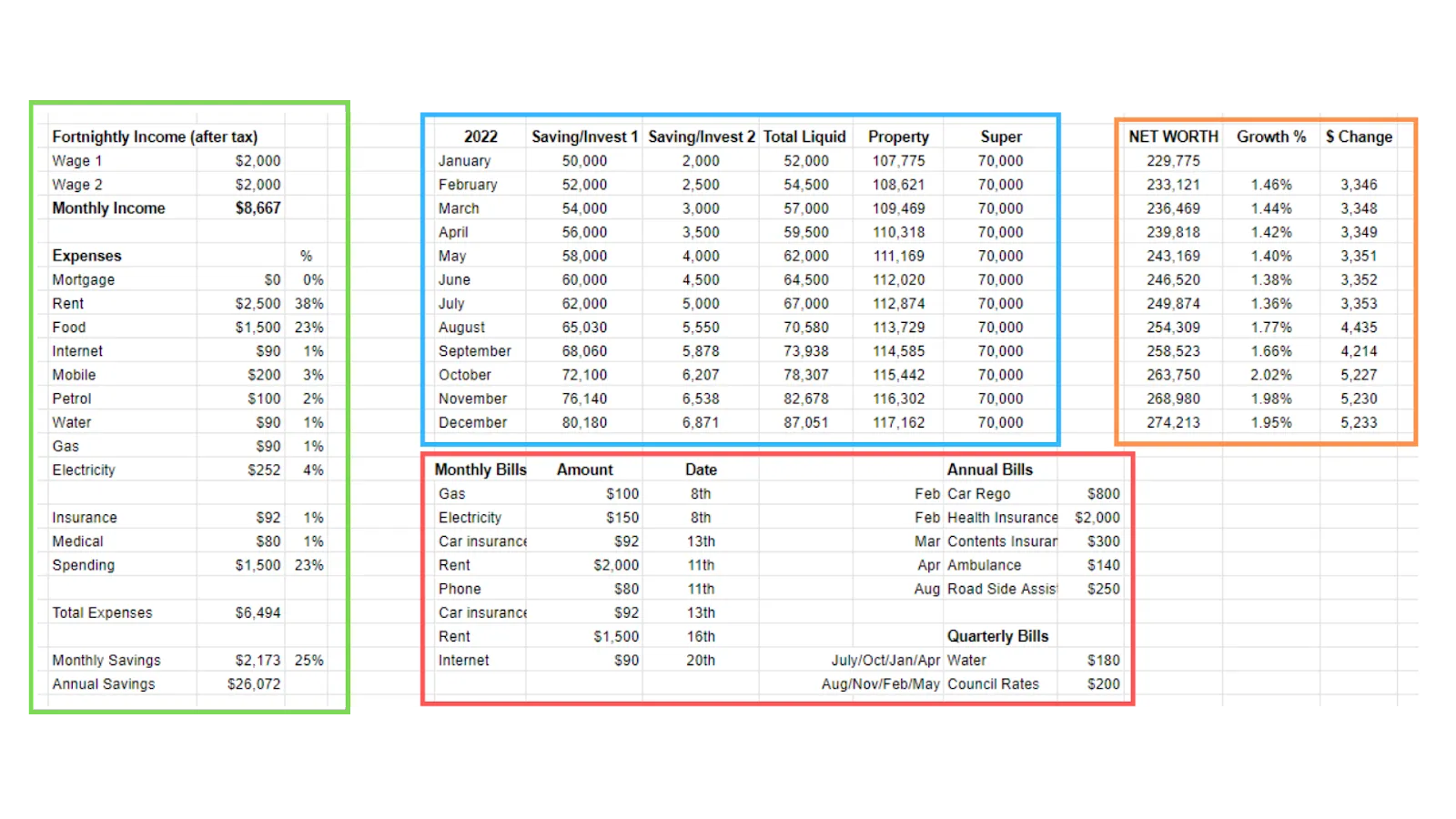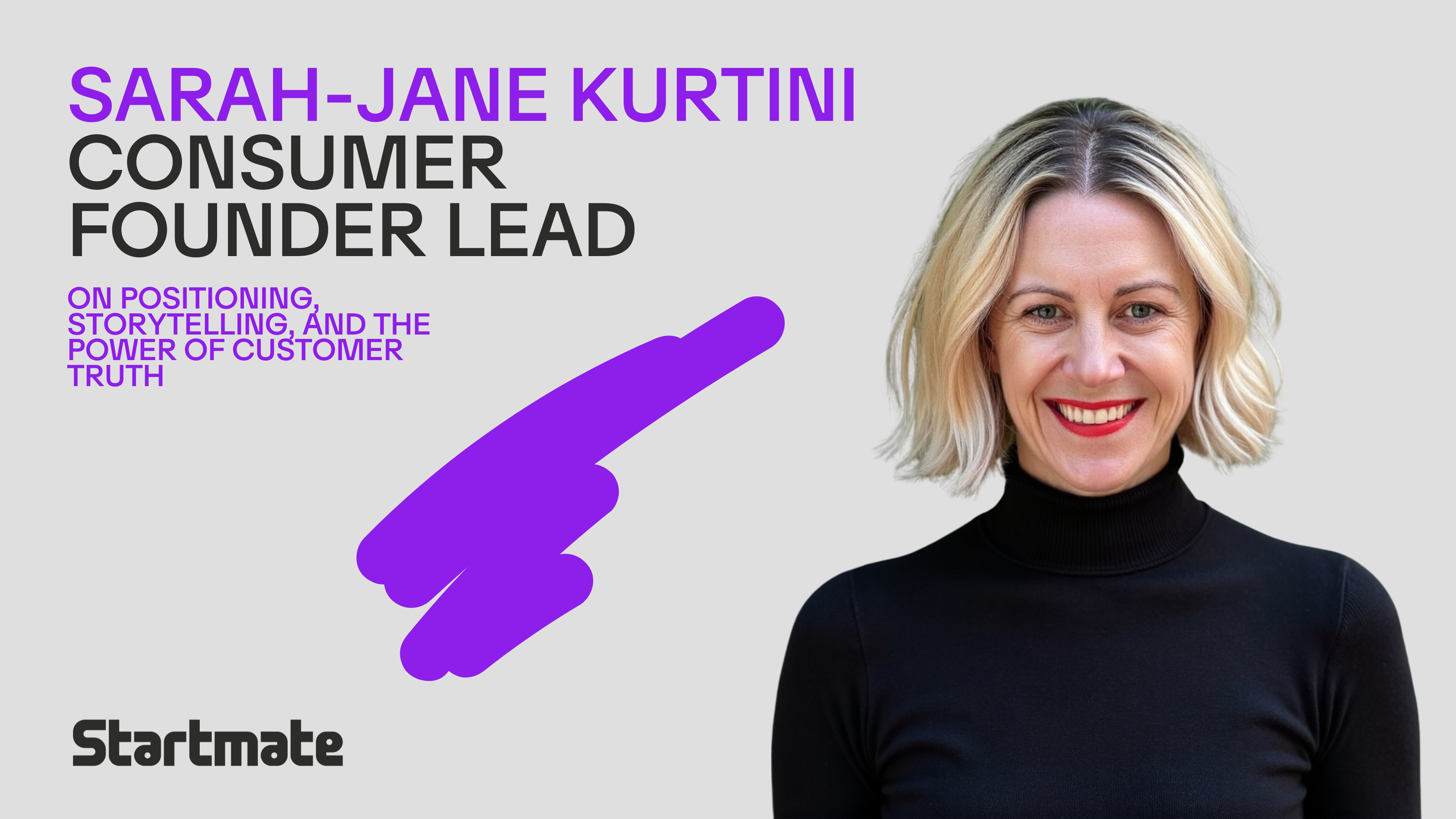How many founders religiously track everything that can kill their startup, but are willing to let fires burn in their personal life which inevitably intersects into their decision-making and productivity, affecting the very thing they’re trying to protect?
How many times have you promised yourself that you’ll sort out your finances, exercise, sleep or diet when things aren’t so busy?
We’re all guilty of ignoring or putting off the important parts of our lives that we assume require too much time and effort to properly manage.
The startup journey requires a precarious balance of focus, complex problem-solving and boundless energy, achieved with systems and decision-making frameworks.
So what if we could implement the same tools and strategies to keep some of the important infrastructure in our life running on autopilot – finances and health – while we focus on growing our beloved startup?
Finances
Every founder has a basic understanding of finances, with terms like runway and burn rate being ubiquitous in the startup lingo repertoire.
In your personal life, most of your expenses are probably fixed and are due/debited on the same day each month. This makes it very simple to plan and forecast.
Depicted below are four components of your financial dashboard, including:
- Annual forecast in green;
- Monthly balances in blue;
- Bills in ed; and
- Totals and movement in orange.
At the start of each month, forecast all the dates you’re paid, and add when all of your expenses are due.

For simplicity, I reconcile (make sure the real balance matches my spreadsheet) spending on groceries and leisure activities each Sunday, because I update the previous week's expenses and my current bank balance every Monday morning. This means I review the spreadsheet to make sure the money went out when it was supposed to and the balance matches my bank balance after actual-spending adjustments.
If it’s not a forecasted, regular expense, then it’s allocated to spending to simplify and help you stick with the weekly review (which, admittedly, can make for tough reading for the weekends that get away from you).
It’s likely that the first few times you do this you won’t believe how much you’re spending week to week, but you can’t hope to implement new habits until you fully understand your current behaviour. Once you do this for a few weeks you’ll quickly get better at knowing where your money is going.
I try to individually allocate each expense on the day it occurred unless it is related to leisure spending or food/groceries.
I make allocations to savings or investments on Monday mornings after reviewing the previous week's spending and reconciling the balance to my bank account. When I started out with investing, ETFs like Spaceship or Raiz were perfect because it’s quick and easy to add discretionary amounts. I don’t like to have a set direct debit amounts anymore because I invest in other opportunities as well as ETFs. However, all my bills are direct debited where possible to eliminate the need for me to try and remember to make the payments.

If you’re in the fortunate position to be able to be saving or investing, there is a tab just for tracking your investments. I only update the balances monthly, because I want to set and forget as much as possible and I only invest in long-term investments. Without getting too far into the weeds of value investing, patience and ETFs could be your best friend when looking for solid returns over a long period of time without a lot of time required for thought and decision-making. (This is not financial advice.)If that’s too risky for you, I’d recommend learning about value investing and ETFs in the short term while applying the same philosophy with the investment allocation going into a savings account.
Your personal finances and spending is less of a math problem (relatively simple to solve) and more of a behaviour change problem (very complex). Whether we’d like to admit it or not, the way we view wealth, buying ‘things’' and our overall lifestyle are heavily influenced by our surrounding environment.
Managing our finances is a continuous conflict between wanting to save and invest to achieve a certain lifestyle, while feeling like we’re keeping up with our tribe in everything from luxury purchases to insta-worthy holidays (and now NFTs).
The greatest spreadsheet in the world is meaningless if your goals don’t align with your values.
Here is the spreadsheet template I created for managing finances. If you’re not familiar with Sheets or Excel there’ll be a bit of a learning curve (but your life will be unequivocally better once you learn the basics of the greatest software of the last 50 years).
Key points to remember
Weekly
- Reconcile your budget to your actual bank balance (make sure they are both the same number to start the week or period you’re measuring).
- Ensure each expense went out on the day it was supposed to in the previous week.
- Review the upcoming week's expenses and ensure you have enough cash for your required payments.
- Allocate money into an ETF, investment or savings account if you so choose.
Monthly
- Forecast all of the dates you’re getting paid, what day your bills are due/debited and any changes to your spending habits.
- Update the balance on your investments to view the gains/losses.
- Ensure any quarterly or annual bills are added into the upcoming month to avoid nasty surprises.
Annually
- Set your goals, but keep this flexible and understand life is unpredictable. People overestimate what they can achieve in a week and underestimate what they can achieve in a year.
- Keep in mind that you can only live without saving any money for a short period of time.
- If you want to start investing, explore ETFs. I really like what Spaceship has built and the returns the last couple of years have been solid. However I can assure you as a sports fan, past performance is not a reliable indicator of future success.
- Keep it simple. Consistently understanding where your money is allocated is the most important aspect of managing your finances.
- Protect your downside. Given life in your startup will feel like everything is on the line all the time, you’ll want to minimise the risks of your personal wealth and investments. If you’re in a situation where you aren’t saving any money, consider how long you can realistically do that for.
Health
Exercise, diet and sleep are heavily intertwined. Diet and sleep are our two best methods for reducing reluctance to consistently exercising and are our biggest energy generators too.
You can live a somewhat healthy life with a moderately low level of exercise if you have excellent diet and sleep habits. However, it’s unlikely that you’ll thrive in any scenario where your diet and sleep habits are poor.
Exercise
For many of us, our relationship with exercise could be described as being friends with someone super flakey who only shows up when they’re highly motivated and want something from you. Finding a way to systematically ensure we achieve our exercise goals is incredibly important. You could even say your life depends on it.
Thankfully, there has been an abundance of innovation in the health tech space. We’re spoilt for choice when it comes to tracking exercise.
My personal stack is utilising my Apple Watch for tracking and entering workouts while utilising a spreadsheet to oversee monthly goals and annual targets.
Like anything, if you’re starting from scratch, don’t set unrealistic goals. Remember we’re trying to implement new habits and routines, so consistency is the goal initially until we’ve built the habit.
For example, if you want to start working out in the mornings, get good at just getting up early in the morning. I’ve never missed a workout once I’m awake and in my exercise clothes.
When getting started, don’t simply think about an overarching goal – such as ‘exercise 3 times per week’. Instead, spend time examining the surrounding infrastructure that will enable those exercise sessions. Block out the time in your calendar for exercise, plan your trip there and back if going to a gym, make sure you eat a healthy meal prior.
Ultimately, focus on achieving a certain number of sessions rather than outcomes like weight or what you’ll look like. Do you think Olympians set a goal of looking good at the beach?
Key points to remember
- If you’re starting from scratch, start small. Start with steps. Walking is the most underrated exercise on the planet. It enables us to think clearer, and discover new sights and experiences in our own neighbourhood. Thanks to podcasts and audiobooks we can even learn or be entertained while doing it.
- Can you find a way to walk 30 minutes to and from work each day by varying the way you get to work? Completing 60 minutes of walking each day is a great minimum quantity of exercise if you’re incredibly pressed for time. That way if you aren’t able to exercise for whatever reason on a particular day you’ve already achieved 60 minutes of walking.
- Keep in mind that the days you don’t feel like working out are the most important. I used to do a few high-intensity sessions per week early in the morning. But I would come unstuck trying to balance the disparate wake time. Eventually, getting up at the same time everyday and adjusting the intensity of the workouts to a point where I could do them daily was very effective. In short, optimise for consistency.
Sleep
A lot of people think they can optimally function with a well-below-average amount of sleep. They can’t. There is also a lot of hustle porn that absurdly casts sleep as the ugly stepchild of exercise and diet. The truth is, sleeping might be the most important but neglected element of human life.
Poor sleep is associated with many physiological health risks as well as an increased risk in depression. Regularly trading a few extra hours of sleep to work will almost definitely raise questions about your efficiency in the 16 hours or so that you’re awake. We all go through periods of additional work where sacrificing sleep is a necessity, but these periods should be short and infrequent to minimise the risks to your overall productivity and health.
When optimising our sleep, routine and environment are critically important. It’s worth trialling and experimenting with different options to see what works best for you. I’ve never been good at getting to sleep, and this was exacerbated by becoming a founder.
For the last 5 years or so, I haven’t been able to go to sleep without listening to a podcast. It might sound difficult but it’s just become a part of my routine, and depending on what content is available, an enjoyable part of my routine at that.
For tracking, I use the Apple Watch App Autosleep. I set it when going to sleep, and in the morning, it lets me know my total sleep hours, amount of deep sleep and daily HRV readiness. I find that my cumulative sleep numbers provide an accurate reflection on how I feel.
Tracking proves to be useful when you want to test out changes to your sleep routine or adjust your wake time. When I first moved into an inner city apartment, I was noticeably more exhausted from my usual routine. This led me down the sleep tracking path, and by far the biggest improvement was by creating a simple window cover from Bunnings/Spotlight to make the room completely dark at night.
Key points to remember
- Darken your bedroom by either installing blackout blinds if you’re not renting, or creating a cover with blackout curtain material from spotlight and some velcro on each corner. This might take a couple of hours to make and then 30 seconds to add at night and remove in the morning.
- If you want to start going to bed earlier, start getting up earlier. It will make you more tired at night. A simple tip for getting out of bed earlier. Set an alarm on your watch, then another one for 10 minutes later in your living room.
- If you want to start exercising in the morning, set out your clothes next to your bed. Ideal scenario = watch alarm > clothes on > prevent living room alarm > coffee > bonus exercise or general morning time.
- Consuming caffeine late in the day can have a strong impact on your deep sleep. Try substituting any coffee after 2PM with either green tea (less caffeine than coffee) or other teas such as dandelion, lemon and ginger or anything that doesn’t have caffeine.
Diet
Your diet habits don’t start at dinnertime; they start when you buy your groceries. A further step backward again is planning a range of healthy, uncomplicated meals to prepare if you’re short on time (which we all are). Where you can, simplify both the decision-making and preparation of as many meals as you can during days when you’re pressed for time.
When I used to eat breakfast, it would be 3 scrambled eggs every single day. And I don’t really like eggs. But before you stop reading and tell everyone you know I’m a psychopath, changing the way I thought about food simplified more things than I imagined. Let’s assume most adults eat 21 meals a week (breakfast, lunch and dinner, 7 days a week). By automating the decision-making of at least breakfast and lunch every weekday (10 meals) I never need to think about almost half of the meals I eat. By simply having 3 scrambled eggs and tofu/chicken, brown rice and vegetables for lunch, I’m able to optimise for simplicity and nutritional output. For dinner I vary meals each night to ensure a balanced diet and because my wife isn’t as enthused as me about living like a robot.
By reframing my attitude toward food to be about nutrition, energy output and automation rather than entertainment, it’s been able to free up time and cognitive load while also giving me more energy. Although I sound like the least fun person ever, I am a notorious weekend fast-food enthusiast and stuck-up foodie, but weekdays are for healthy meals.
When we’re talking about nutrition, there are a number of strategies you can utilise to generate a healthy and energetic flywheel. It’s not that deciding what to have for breakfast is hard or particularly time-consuming, but when you add up all the decisions you’re required to make, and the way to allocate your most precious resource, your time, marginal gains are the difference between the best version of you.
Key points to remember
- Simplify and optimise your meals for both preparation time and nutritional quality where you can and aim for at least 3 and ideally 5 vegetables per lunch and dinner meal. Spend some time planning all of your weekday meals and eliminating any unnecessary steps that can help simplify this process.
- Ease into meal prep by buying 5 healthy pre-made microwave meals from the supermarket before your next work week to feel the benefits of eliminating the time and thought of buying lunch every day.
- If culture eats strategy for breakfast, then preparation eats willpower for lunch and dinner. Don’t rely on willpower when deciding what to eat when you’re hungry and tired. By simply having healthy and filling snacks around between meals you’ll be able to avoid any unhealthy cravings that arise.
- Drink more water. Figure out how much you should be drinking each day, add 20% for a margin of error, measure your drink bottle capacity and then systematically ensure you drink it that number of times per day.
Here is the spreadsheet template I created for tracking exercise, health goals and other habits.
Conclusion
Above all else, go easy on yourself when you aren’t hitting your goals. Great founders have a particular level of grit, but there can be diminishing returns when you’re gritting through long periods of poor sleep, absence of exercise or completely diminishing your personal finances because you believe it's a necessary sacrifice to the startup gods for your eventual success.
If you’ve read this like a grouchy tax auditor and audibly mumbled ‘well I can’t do that because of x…’, my response is that we’re all limited by constraints. As every founder knows, constraints lead to innovative problem-solving. Different living environments, work locations, lockdowns and having kids have led to many iterations of my life OS, and ironically, many optimisations that I never would have discovered without the constraints. The most important insight of all is to focus on progress over perfection. Missing a workout, oversleeping, eating fried chicken for breakfast on a Monday — happens to all of us. But the best version of ourselves bounces back and doesn't let a small slip up ruin an entire week, month or longer. Mistakes are a feature, not a bug of being human, so embrace them on the way to building your own OS.
Recommended resources
- Atomic Habits by James Clear. A wealth of practical tips and habit building concepts.
- Thinking in Bets by Annie Duke. The quality of our lives = the sum of decision quality (bets)+ luck.
- Stillness is the key by Ryan Holiday. The tools to harness the power of slowing down your body and mind for less distractions, better self-control, and above all, a happier and more peaceful life.






%204.webp)
.png)
